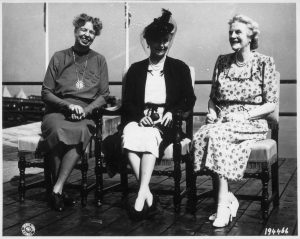1943-1945
Summer 1945 (Age 70)

Winston Churchill, Parliament Square, London © Sue Lowry & Magellan PR
March 20, 2015
July election turns out the Conservatives
Despite Churchill’s war record his Party’s prospects for reelection were discouraging. Since 1942 the Gallup poll had shown a large Labour lead. Eight Conservative candidates, unopposed by Labour because of a wartime electoral truce, had already been beaten by independents.
The Conservatives focused on Churchill as the leader who had won the war. Churchill reminded the overseas troops that there was “no truth that you can vote Labour or Liberal without voting against me.” As grateful as they were, many people expressed concern that the great war leader would not be a good peace leader. He was even heckled at Walthamston Stadium. He responded to that challenge by telling the hecklers that he forgave them because they were about to receive a thrashing.
“I thank the British people for many kindnesses shown towards their servant.”
From the beginning he struck hard against his opponents. Controversy ensued when he said the Socialists “would have to fall back on some form of Gestapo.” His daughter Mary later recounted how her mother begged Churchill “to delete the odious and invidious reference to the Gestapo. But he would not heed her.” His daughter Sarah told him that Socialism as practiced in the war did no harm, and did quite a lot of people good.” Churchill’s views were influenced by the recently published Road to Serfdom, which argued that economic planning resulted inevitably in totalitarian government and the extinction of personal liberty. Years later Churchill told the author of the book that while his ideas were good they would never work in Britain.
Polling day was 5 July in Britain but it took three weeks to count the service vote. Meanwhile Churchill flew to Bordeaux to rest before moving on to Berlin. Shortly after arriving in the German capital Churchill, with his daughter Mary, toured its ruins including Hitler’s Chancellery. When Churchill observed the German populace he said his “hate died with their surrender.” On the same day he met President Truman for the first time. A few days later the two leaders agreed to use the atomic bomb against Japan.
Churchill’s last public event as British Prime Minister occurred on 21 July when he took the victory salute in Berlin. “Twice in one generation,” he told the troops, “as in bygone times the German fury has been unleashed on her neighbours. Now it is we who take our place in the occupation of this country.”
Among the cheers, however, were ominous signs. John Peck noted how “the great war leader but for whom we should never have been in Berlin at all, got a markedly less vociferous cheer than Mr. Attlee.”
On 25 July Churchill left Stalin and Truman, without saying goodbye, to return to London with Attlee to await the results of the election. On 28 July Clement Attlee returned to Berlin as Prime Minister.
Unknown to anyone but his doctor, Churchill had a premonition of the results in a dream. “I dreamed that life was over. I saw — it was very vivid — my dead body under a white sheet on a table in an empty room. I recognized my bare feet projecting from under the sheet. It was very life-like. Perhaps this is the end.”
The concession speech included the admirable comment: “I thank the British people for many kindnesses shown towards their servant.” This remark stands in contrast to Stalin’s reported comment that he was surprised because he had supposed that Churchill would have “fixed” the results. On 29 July Churchill signed “finis” in the visitors’ book at Chequers. Many high-ranking officials who owed their positions to Churchill, including Lord Louis Mountbatten, were now expressing Labour sympathies.
When Chamberlain had resigned in 1940 many Conservatives clearly expressed their preference for him over the new Prime Minister. This time, however, the Conservative MPs showed their hearts were with Churchill. When he entered the House on 1 August they sang an enthusiastic “For He’s a Jolly Good Fellow.” Later he joined Attlee to celebrate VJ-Day and clearly received greater ovations.
On 16 August the House recognized Churchill’s war leadership. The new Prime Minister spoke for all when he said that Churchill’s “place in history is secure.”
Subscribe
WANT MORE?
Get the Churchill Bulletin delivered to your inbox once a month.




